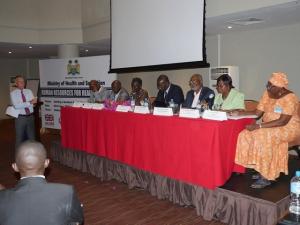High level international conference on health workforce ends in Sierra Leone
In order to address some of the staffing challenges that affect Sierra Leone's health sector, a two-day summit attended by technical and policy experts from around the world was held in Freetown, Sierra Leone from 2-3 June 2016. The summit, organized by the Ministry of Health and Sanitation with support from the World Health Organization and the Clinton Health Access Initiative aimed to lay a foundation to improve human resources for health in Sierra Leone .
Sierra Leone’s health sector is faced with a number of challenges including a critical shortage of skilled health workers. All of the country’s districts fall short of WHO’s recommended minimum thresholds for health worker density (22.8 health workers per 10,000 population). Distribution and retention of the available trained health workers throughout the country also pose significant challenges.
While the Ministry of Health and Sanitation (MoHS) prepared a Human Resources for Health Policy in 2012 and Human Resources for Health Strategic Plan (2012–2016), the implementation and impact of these policy documents were, in part, hampered by the Ebola outbreak which disrupted health service delivery in every part of the country. The outbreak infected more than 8,000 people with over 3,500 deaths, including close to 300 health workers who were also killed by the outbreak. The impact of the outbreak highlighted the critical role of skilled human resources for health in building and maintaining a resilient health system.
Insufficient staffing levels have been long recognized as key barrier to a resilient health system in Sierra Leone. The gap between actual and required staff has over the years been most critical in higher cadres, particularly doctors and midwives, recent studies have found.
The high-level meeting served as a platform for local and international experts to share experiences as well as provide guidance and expertise on best practices, policies and strategies for tackling human resourcing issues in the health sector - from doctors to community health worker. It initiated a government-led process to develop a new multi-year human resourcing strategy and policy for the country.
The Government of Sierra Leone is now implementing a 10-24 month post-Ebola Recovery Plan with a critical focus on building a resilient workforce through enhanced production, clinical mentoring, retention, attendance and adequate distribution of skilled health workforce in health facilities. To complement these efforts, the Ministry of Health and Sanitation with support from WHO and other partners, has updated its Human Resources Information System (HRIS) and is creating a refreshed Human Resources for Health Country Profile to provide guidance on strategic decisions for the development of a new HRH Policy and Strategic pla




